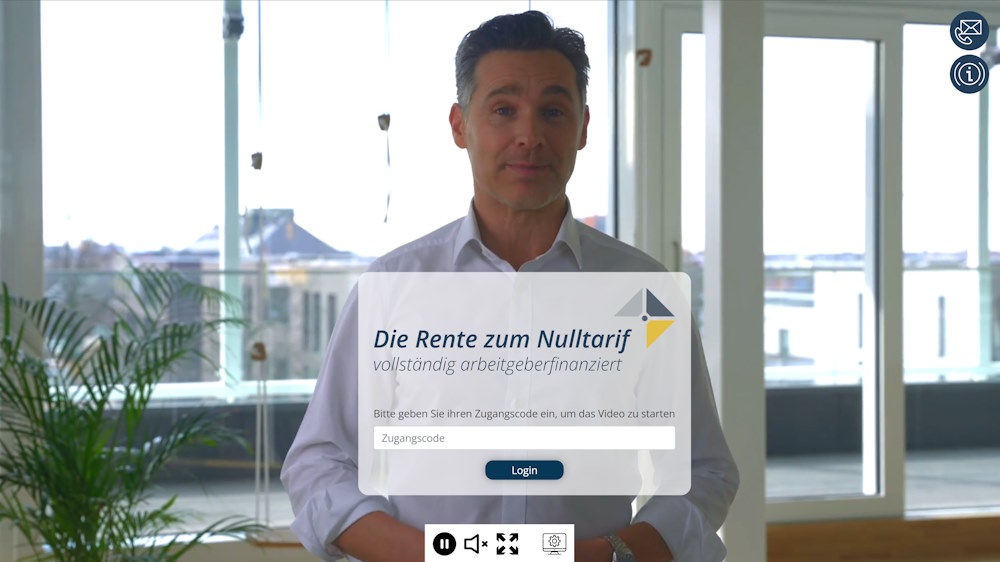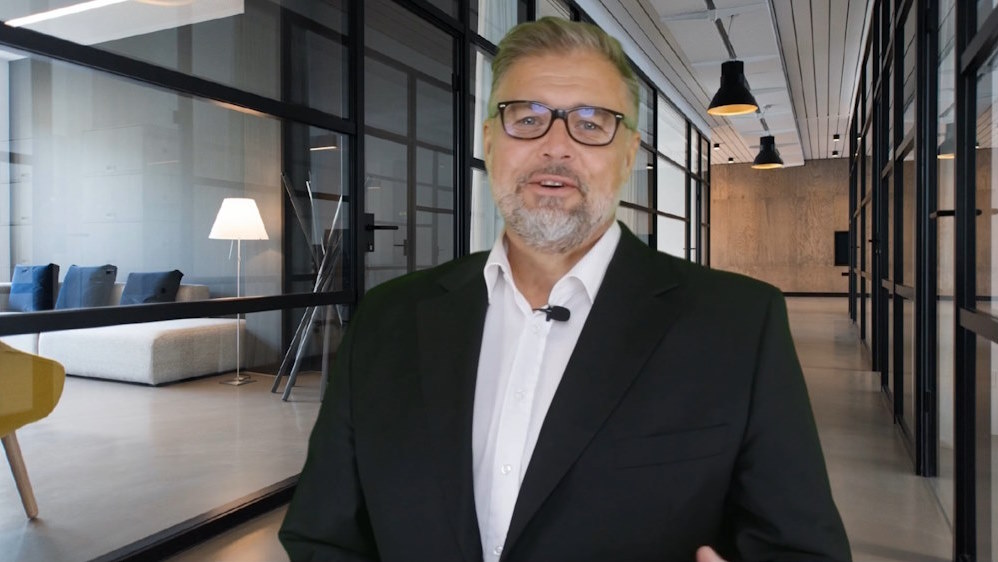Können Sie mich gut sehen und verstehen?
Ja NeinIn 3 Schritten zur Rente zum Nulltarif
1.
2.
3.
Das sollte natürlich nicht sein. Dürfen wir Sie dazu kontaktieren? Bitte nennen Sie uns Ihren Namen und eine Telefonnummer, unter der wir Sie erreichen können. Alternativ können Sie sich auch an Ihre Personalabteilung wenden.
Vielen Dank. Wir werden uns in Kürze telefonisch mit Ihnen in Verbindung setzen.
Vielen Dank. Wir freuen uns, Sie hier in Kürze wieder begrüßen zu dürfen.
Bedienungshinweise
- Anhalten/fortführen mit STOP und START
- Mit Weiter/Zurück zur nächsten/vorherigen Szene
- i-Button für zusätzliche Informationen
- Anwendung möglichst nicht durch Schließen des Browsers beenden

- Geld kann im Ruhestand knapp sein
- Ihr Arbeitgeber unterstützt bei Aufbau zusätzlicher Rente
- Rente zum Nulltarif, ohne Einsatz eigenen Geldes
Teil 1
Teil 2
Teil 3
Situation der gesetzlichen Rente


Wichtige Gründe für eine zusätzliche Rente
- Rentenniveau wird stetig abgesenkt
- Bereits heute weniger als die Hälfte des letzten Nettogehalts
- Mehr als 75% aller Rentner erhalten weniger als 1.000 € Rente
- Kosten bleiben
- Wichtig: Zusätzliche Rente = Betriebsrente = Rente zum Nulltarif
Herkömmliche Betriebsrente
|
ohne Betriebsrente*
|
mit Betriebsrente*
|
|
|---|---|---|
| Bruttogehalt | 2.000,- € | 2.000,- € |
|
Betriebsrente
(Entgeltumwandlung)
|
0,- € | -100,- € |
| Verbleibendes Bruttogehalt | 2.000,- € | 1.900,- € |
|
Lohnsteuer
(inkl. KiSt und Soli)
Sozialversicherung
|
500,- € | 450,- € |
|
Auszahlungsbetrag
(durch Eigenanteil weniger)
|
1.500,- € | 1.450,- € |
|
Eigenanteil für
Betriebsrente
|
--- | -50,- € |
Schade, aber selbstverständlich wollen wir auch Ihnen ein Angebot machen. Dürfen wir Sie dazu telefonisch kontaktieren? Bitte nennen Sie uns Ihren Namen und eine Telefonnummer, unter der wir Sie erreichen können. Alternativ können Sie sich auch an Ihre Personalabteilung wenden.
Vielen Dank. Wir werden uns in Kürze telefonisch mit Ihnen in Verbindung setzen.
Vielen Dank. Wir freuen uns, Sie hier in Kürze wieder begrüßen zu dürfen.
Laut unseren Unterlagen haben Sie bereits teilgenommen. Sollte dies ein Fehler sein, kontaktieren Sie uns bitte unter support@renteundmehr.de oder Telefon +49 28 71 / 27 71 - 33
Rente zum Nulltarif
|
ohne Betriebsrente*
|
mit Betriebsrente*
|
|
|---|---|---|
| Bruttogehalt | 2.000,- € | 2.000,- € |
|
Internetpauschale
(Brutto = Netto)
|
0,- € | +50,- € |
| Rente zum Nulltarif | --- | -100,- € |
|
Lohnsteuer
(inkl. KiSt und Soli)
Sozialversicherung
|
500,- € | 450,- € |
|
Auszahlungsbetrag
bleibt gleich |
1.500,- € | 1.500,- € |
|
Eigenanteil für
Rente zum Nulltarif |
--- | 0,- € |
FAQ - Häufig gestellte Fragen
- Spouse or partner in a registered civil partnership
- The named cohabiting partner or partner in a non-registered civil partnership (marriage-like partnership)
- Children entitled to child benefit up to a maximum age of 25.
If there are no surviving dependants, a death grant can be paid to the next of kin. This amounts to a maximum of EUR 8,000. If the entitlement is less than EUR 8,000, this amount can be paid out as a death grant.
Vielen Dank für Ihre Aufmerksamkeit. Sollten Sie Fragen zu Ihrer ‚Rente zu Nulltarif‘ haben, wenden Sie sich bitte an Ihre/n Personalabteilung/-verantwortliche/n.
Teil 1
Teil 2
Teil 3
Datenschutzerklärung (Art. 13 und Art. 14 DSGVO)
For legal reasons, the privacy policy is written in German.
Diese Datenschutzerklärung im PDF-Format
ALLGEMEIN
Information über die Erhebung personenbezogener Daten und Kontaktdaten des Verantwortlichen
Diese Datenschutzerklärung klärt Sie über die Art, den Umfang und Zweck der Verarbeitung von personenbezogenen Daten (nachfolgend kurz „Daten“) im Rahmen der Erbringung unserer Leistungen sowie innerhalb unseres Onlineangebotes und der mit ihm verbundenen Webseiten, Funktionen und Inhalte.
Im Hinblick auf die verwendeten Begrifflichkeiten, wie z.B. „Verarbeitung“ oder
„Verantwortlicher“ verweisen wir auf die Definitionen im Art. 4 der Datenschutzgrundverordnung (DSGVO).
Verantwortlicher
praemium GmbH
Philipp-Reis-Straße 3
D-46397 Bocholt
Telefon: +49 28 71 / 27 71 - 0
Geschäftsführer: Klaus Tenbrock
Datenschutzbeauftragter
Ass. jur. Robert Hülshorst
E-Mail: datenschutz@praemium.de
I Bereitstellung der Website und Erstellung von Logfiles
- Beschreibung und Umfang der Datenverarbeitung
Bei jedem Aufruf unserer Website erfasst unser System automatisiert Daten und Informationen vom Computersystem des aufrufenden Rechners. Folgende Daten werden hierbei erhoben:
- Informationen über den Browsertyp und die verwendete Version
- Das Betriebssystem des Nutzers
- Den Internet-Service-Provider des Nutzers
- Die IP-Adresse des Nutzers
- Datum und Uhrzeit des Zugriffs
- Websites, von denen das System des Nutzers auf unsere Internetseite gelangt
- Websites, die vom System des Nutzers über unsere Website aufgerufen werden
Die Daten werden ebenfalls in den Logfiles unseres Systems gespeichert. Eine Speicherung dieser Daten zusammen mit anderen personenbezogenen Daten des Nutzers findet nicht statt.
- Rechtsgrundlage für die Datenverarbeitung
Rechtsgrundlage für die vorübergehende Speicherung der Daten und der Logfiles ist Art. 6 Abs. 1 lit. f DSGVO.
- Zweck der Datenverarbeitung
Die vorübergehende Speicherung der IP-Adresse durch das System ist notwendig, um eine Auslieferung der Website an den Rechner des Nutzers zu ermöglichen. Hierfür muss die IP- Adresse des Nutzers für die Dauer der Sitzung gespeichert bleiben.
Die Speicherung in Logfiles erfolgt, um die Funktionsfähigkeit der Website sicherzustellen. Zudem dienen uns die Daten zur Optimierung der Website und zur Sicherstellung der Sicherheit unserer informationstechnischen Systeme. Eine Auswertung der Daten zu Marketingzwecken findet in diesem Zusammenhang nicht statt.
In diesen Zwecken liegt auch unser berechtigtes Interesse an der Datenverarbeitung nach Art. 6 Abs. 1 lit. f DSGVO.
- Dauer der Speicherung
Die Daten werden gelöscht, sobald sie für die Erreichung des Zweckes ihrer Erhebung nicht mehr erforderlich sind. Im Falle der Erfassung der Daten zur Bereitstellung der Website ist dies der Fall, wenn die jeweilige Sitzung beendet ist.
Im Falle der Speicherung der Daten in Logfiles ist dies nach spätestens sieben Tagen der Fall. Eine darüberhinausgehende Speicherung ist möglich. In diesem Fall werden die IP-Adressen der Nutzer gelöscht oder verfremdet, sodass eine Zuordnung des aufrufenden Clients nicht mehr möglich ist.
- Rechte der betroffenen Person
Das geltende Datenschutzrecht gewährt Ihnen gegenüber dem Verantwortlichen hinsichtlich der Verarbeitung Ihrer personenbezogenen Daten umfassende Betroffenenrechte (Auskunfts- und Interventionsrechte), über die wir Sie nachstehend informieren:
Auskunftsrecht gemäß Art. 15 DSGVO: Sie haben insbesondere ein Recht auf Auskunft über Ihre von uns verarbeiteten personenbezogenen Daten, die Verarbeitungszwecke, die Kategorien der verarbeiteten personenbezogenen Daten, die Empfänger oder Kategorien von Empfängern, gegenüber denen Ihre Daten offengelegt wurden oder werden, die geplante Speicherdauer bzw. die Kriterien für die Festlegung der Speicherdauer, das Bestehen eines Rechts auf Berichtigung, Löschung, Einschränkung der Verarbeitung, Widerspruch gegen die Verarbeitung, Beschwerde bei einer Aufsichtsbehörde, die Herkunft Ihrer Daten, wenn diese nicht durch uns bei Ihnen erhoben wurden, das Bestehen einer automatisierten Entscheidungsfindung einschließlich Profiling und ggf. aussagekräftige Informationen über die involvierte Logik und die Sie betreffende Tragweite und die angestrebten Auswirkungen einer solchen Verarbeitung, sowie Ihr Recht auf Unterrichtung, welche Garantien gemäß Art. 46 DSGVO bei Weiterleitung Ihrer Daten in Drittländer bestehen;
Recht auf Berichtigung gemäß Art. 16 DSGVO: Sie haben ein Recht auf unverzügliche Berichtigung Sie betreffender unrichtiger Daten und/oder Vervollständigung Ihrer bei uns gespeicherten unvollständigen Daten;
- Recht auf Löschung gemäß Art. 17 DSGVO: Sie haben das Recht, die Löschung Ihrer personenbezogenen Daten bei Vorliegen der Voraussetzungen des Art. 17 Abs. 1 DSGVO zu verlangen. Dieses Recht besteht jedoch insbesondere dann nicht, wenn die Verarbeitung zur Ausübung des Rechts auf freie Meinungsäußerung und Information, zur Erfüllung einer rechtlichen Verpflichtung, aus Gründen des öffentlichen Interesses oder zur Geltendmachung, Ausübung oder Verteidigung von Rechtsansprüchen erforderlich ist;
- Recht auf Einschränkung der Verarbeitung gemäß Art. 18 DSGVO: Sie haben das Recht, die Einschränkung der Verarbeitung Ihrer personenbezogenen Daten zu verlangen, solange die von Ihnen bestrittene Richtigkeit Ihrer Daten überprüft wird, wenn Sie eine Löschung Ihrer Daten wegen unzulässiger Datenverarbeitung ablehnen und stattdessen die Einschränkung der Verarbeitung Ihrer Daten verlangen, wenn Sie Ihre Daten zur Geltendmachung, Ausübung oder Verteidigung von Rechtsansprüchen benötigen, nachdem wir diese Daten nach Zweckerreichung nicht mehr benötigen oder wenn Sie Widerspruch aus Gründen Ihrer besonderen Situation eingelegt haben, solange noch nicht feststeht, ob unsere berechtigten Gründe überwiegen;
- Recht auf Unterrichtung gemäß Art. 19 DSGVO: Haben Sie das Recht auf Berichtigung, Löschung oder Einschränkung der Verarbeitung gegenüber dem Verantwortlichen geltend gemacht, ist dieser verpflichtet, allen Empfängern, denen die Sie betreffenden personenbezogenen Daten offengelegt wurden, diese Berichtigung oder Löschung der Daten oder Einschränkung der Verarbeitung mitzuteilen, es sei denn, dies erweist sich als unmöglich oder ist mit einem unverhältnismäßigen Aufwand verbunden. Ihnen steht das Recht zu, über diese Empfänger unterrichtet zu werden.
- Recht auf Datenübertragbarkeit gemäß Art. 20 DSGVO: Sie haben das Recht, Ihre personenbezogenen Daten, die Sie uns bereitgestellt haben, in einem strukturierten, gängigen und maschinenlesebaren Format zu erhalten oder die Übermittlung an einen anderen Verantwortlichen zu verlangen, soweit dies technisch machbar ist;
- Recht auf Widerruf erteilter Einwilligungen gemäß Art. 7 Abs. 3 DSGVO: Sie haben das Recht, eine einmal erteilte Einwilligung in die Verarbeitung von Daten jederzeit mit Wirkung für die Zukunft zu widerrufen. Im Falle des Widerrufs werden wir die betroffenen Daten unverzüglich löschen, sofern eine weitere Verarbeitung nicht auf eine Rechtsgrundlage zur einwilligungslosen Verarbeitung gestützt werden kann.
- Durch den Widerruf der Einwilligung wird die Rechtmäßigkeit, der aufgrund der Einwilligung bis zum Widerruf erfolgten Verarbeitung nicht berührt;
- Recht auf Widerspruch gemäß Art. 21 DSGVO: Wenn wir im Rahmen einer Interessenabwägung Ihre personenbezogenen Daten aufgrund unseres überwiegenden berechtigten Interesses verarbeiten, haben Sie jederzeit das Recht, aus Gründen, die sich aus Ihrer besonderen Situation ergeben, gegen diese Verarbeitung Widerspruch mit Wirkung für die Zukunft einzulegen. Ihren Widerspruch können Sie uns auf den oben angegebenen Kontaktwegen zukommen lassen. Machen Sie von Ihrem Widerspruchsrecht Gebrauch, beenden wir die Verarbeitung der betroffenen Daten. Eine Weiterverarbeitung bleibt aber vorbehalten, wenn wir zwingende schutzwürdige Gründe für die Verarbeitung nachweisen können, die Ihre Interessen, Grundrechte und Grundfreiheiten überwiegen, oder wenn die Verarbeitung der Geltendmachung, Ausübung oder Verteidigung von Rechtsansprüchen dient. Werden Ihre personenbezogenen Daten von uns verarbeitet, um Direktwerbung zu betreiben, haben Sie das Recht, jederzeit Widerspruch gegen die Verarbeitung betreffender personenbezogener Daten zum Zwecke derartiger Werbung einzulegen. Sie können den Widerspruch wie oben beschrieben ausüben. Machen Sie von Ihrem Widerspruchsrecht Gebrauch, beenden wir die Verarbeitung der betroffenen Daten zu Direktwerbezwecken.
- Recht auf Beschwerde gemäß Art. 77 DSGVO: Wenn Sie der Ansicht sind, dass die Verarbeitung der Sie betreffenden personenbezogenen Daten gegen die DSGVO verstößt, haben Sie - unbeschadet eines anderweitigen verwaltungsrechtlichen oder gerichtlichen Rechtsbehelfs - das Recht auf Beschwerde bei einer Aufsichtsbehörde, insbesondere in dem Mitgliedstaat Ihres Aufenthaltsortes, Ihres Arbeitsplatzes oder des Ortes des mutmaßlichen Verstoßes.
Wenn Sie der Auffassung sind, dass eine Datenverarbeitung gegen Datenschutzrecht verstößt, haben Sie das Recht, sich bei einer Datenschutzaufsichtsbehörde zu beschweren.
Eine Liste der deutschen Aufsichtsbehörden finden Sie unter folgendem Link: https://Bfdi.bund.de/DE/Infothek/Anschriften_Links/anschriften_links-node.html
Das sollte natürlich nicht sein. Dürfen wir Sie dazu kontaktieren? Bitte nennen Sie uns Ihren Namen und eine Telefonnummer, unter der wir Sie erreichen können. Alternativ können Sie sich auch an Ihre Personalabteilung wenden.
Vielen Dank. Wir werden uns in Kürze telefonisch mit Ihnen in Verbindung setzen.
Vielen Dank. Wir freuen uns, Sie hier in Kürze wieder begrüßen zu dürfen.






Internetpauschale
- + 600 € pro Jahr
- Brutto = Netto

% Zins
- 100% Garantie
- 100% Insolvenzschutz

Ihre Kapitalleistung
- €
- Ihr Netto bleibt gleich
Schade, dass ich Sie nicht überzeugen konnte.
Haben Sie noch Fragen oder möchten Sie es sich noch überlegen? Sie können sich jederzeit auch an Ihre Personalabteilung wenden.
Vielen Dank für Ihre Zeit und Aufmerksamkeit.
Wer soll das Geld im Falle eines Todes bekommen?*
*Sie können diese Antwort später auch noch einmal schriftlich ändern
Bitte laden Sie die Dokumente durch Klick auf das Download-Symbol herunter, lesen Sie sie sorgfältig durch und bestätigen Sie mit Klick auf die Checkbox, dass sie alles gelesen und akzeptiert haben. Klicken Sie danach auf Weiter.
Folgende Dokumente sind enthalten:
- Beratungsdokumentation
- Ergänzende Vereinbarung
- Entgeltumwandlungsvereinbarung
- Versorgungszusage
For legal reasons, all documents are written in German.
gelesen und akzeptiert
Vielen Dank, Sie können das Fenster jetzt schließen.


